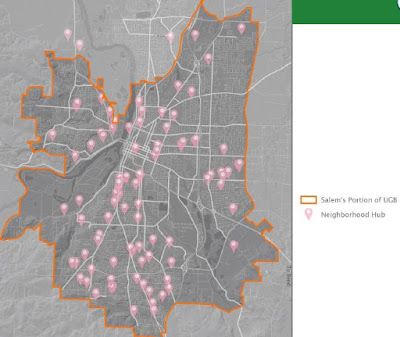 |
| Front page today |
 |
| Wash. Post July 4th |
The frame of our start to summer being "middle of the pack" is accurate so far as it goes, but that context erases the question whether it is appropriate any more to measure "average" with a retrospective look.
There is, instead, evidence that we have to think of a moving average, and that any average calculated from values in previous decades is not predictive. It is true in the sense that it is an accurate mathematical calculation of average, but not true in the sense of probability for the future and for creating expectation. There is tension between a mathematical and psychological understanding of average here.
It seems wrong, then, to stress the comfort and familiarity, the reassuring dullness of an "average" temperature range and amount of rain.
It is likely that this is not a reversion to "normal" but is in fact a new abnormal.
 |
| Register-Guard, June 25th |
 |
| These neighborhood hubs sure cluster along our major arterials |
 |
| Three of the stickers for the mapping charette. Is the bump from 200 to 330 homes actually enough for a hub? |
Now the City's out with a new survey just about Neighborhood Hubs, and it feels more like a temporizing, lateral move than an advance forward. The Pandemic, of course, is the context, and we should allow extra time for things to develop in the right way. So a lateral move might be exactly the right move.
But more specifically, it's also not clear that as we conceive of residential neighborhoods with mostly single, detached housing, and a neighborhood hub as also mostly single, detached housing, we would actually have sufficient numbers of residents to support one or more businesses in a hub. A sustainable hub business cluster will likely require more missing-middle and even large multi-family housing to have a sufficiently large supply of customers in the immediate neighborhood.
 |
| A link between BLM and city planning for advocacy via Twitter |
 |
| Earlier this month |
This is a tension with bottom-up, popular approaches. Changing the neighborhood is not a popular concept.
It may be that we have to have a top-down, deductive kind of approach. If you want to reduce carbon pollution, here are the things you have to do. If you are not willing to do these things, then you are not serious about climate. BLM and Climate Action means changing the look, feel, and function of the city.
Sometimes slow, incremental change is the right approach, but I don't see how we make progress on climate and emissions with slow, incremental change, and Our Salem may not yet be adequate to the moment. We will have baked in one set of assumptions for the Comprehensive Plan and zoning with modest amounts of change, and then will follow with a separate Climate Action Plan that seems certain to call for larger amounts of change, and I do not yet see evidence we are taking climate seriously enough.


1 comment:
350 Salem OR shares your concern about the schedules for completion of Our Salem and for the Climate Action Plan. The latter should precede the former. The first thing that should happen is that the City Council should adopt Salem's goal for greenhouse gas emissions reductions which serves as the basis of the CAP. Portland just adopted a revised one. The CAP goal must also serve as a basic assumption for Our Salem. But we understand that the first meeting of the CAP steering committee will not happen until November and the City Council is planning to adopt their "vision" for Our Salem before then (there is a work session scheduled in September). That's backwards, and we will be advocating strongly to delay any decision on a "vision" until we have a CAP goal.
Post a Comment